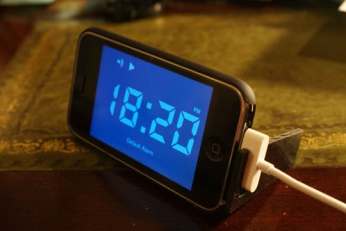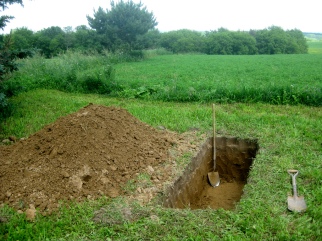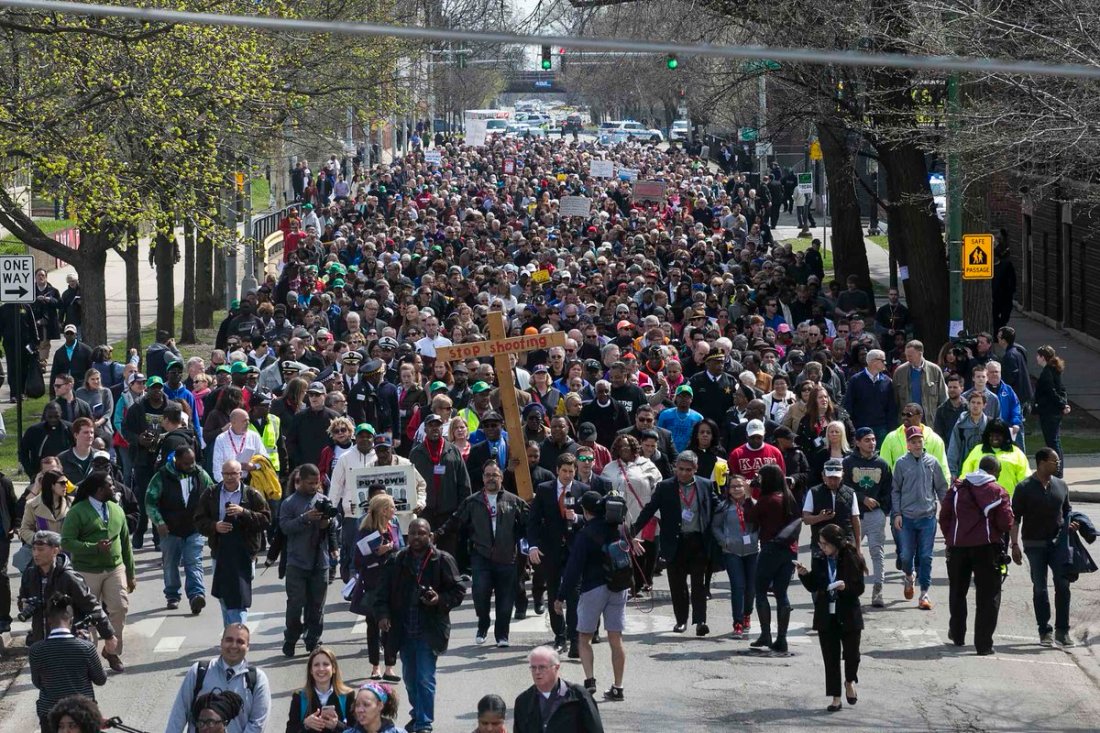Texts: Acts 10:34-43 + Psalm 118:1-2,14-24 + Colossians 3:1-4 + Matthew 28:1-10
 I have this really bad habit. The way I wake up each morning is to the sound of the alarm on my cell phone, which means that when the alarm goes off I roll out of bed and grab my phone off the edge of my dresser and drag it back into bed with me so that I can hit snooze every nine minutes until I’m ready to be awake. This can take up to an hour and, as annoying as that may seem, it’s not even the bad habit I had in mind.
I have this really bad habit. The way I wake up each morning is to the sound of the alarm on my cell phone, which means that when the alarm goes off I roll out of bed and grab my phone off the edge of my dresser and drag it back into bed with me so that I can hit snooze every nine minutes until I’m ready to be awake. This can take up to an hour and, as annoying as that may seem, it’s not even the bad habit I had in mind.
Once I reach the point where it would take more effort to fall back asleep than to simply get out of bed, I turn off the alarm and — now that the phone is in my hand — (here’s the bad habit) I begin to read the headlines that have accumulated in my inbox overnight:
- “United Airlines Passenger is Dragged from an Overbooked Flight”
- “U.S. Drops ‘Mother of All Bombs’ on ISIS Caves in Afghanistan”
- “North Korea May Be Preparing Its 6th Nuclear Test”
“Jesus, have mercy,” I mutter, maybe shouting the news to Kerry in the other room, “Have you heard? About the guy on the plane?”
“Yeah, I need them to stop with that already.”
And then I’m on to, “What do you have going on after work tonight? Do we have plans for dinner?”
That’s how the day begins, with a quick daily dose of trauma, immediately normalized as part of the backdrop to the details of my agenda.
I try to imagine how each of these mornings is filed in my memory. The details each day are different, but my experience of them is the same, so I picture them landing one upon the other the way dirt lands on a coffin at the cemetery, one shovelful at a time. Each morning packing down all the previous mornings so that, over the course of a lifetime, this idea of the world as a place defined by violence and war is compacted, locked into place by the weight of history and expectation.
 If you’ve ever been to a graveyard for a burial, then you know how dense the earth can be. Beneath the topsoil, from which the grass grows, there are layers upon layers of soil filled with sand and clay, peat and loam. Looking into an empty grave from above, you can sometimes see the line where clumps of dirt held together by the root system of the lawn are separated from darker, tightly packed clay. Beneath that the Earth’s crust continues another twenty to thirty miles until it comes to the place where the crust of the earth floats on the upper mantle, forming the tectonic plates on which our homes and cities and civilizations rest.
If you’ve ever been to a graveyard for a burial, then you know how dense the earth can be. Beneath the topsoil, from which the grass grows, there are layers upon layers of soil filled with sand and clay, peat and loam. Looking into an empty grave from above, you can sometimes see the line where clumps of dirt held together by the root system of the lawn are separated from darker, tightly packed clay. Beneath that the Earth’s crust continues another twenty to thirty miles until it comes to the place where the crust of the earth floats on the upper mantle, forming the tectonic plates on which our homes and cities and civilizations rest.
We take it for granted that the ground beneath our feet is solid in much the same way that we take it for granted that reality is fixed and unchanging. Morning after morning, mile after mile of soil and experiences packed too tightly for anything to move too much.
Then, in an instant, the pressure built up beneath the surface breaks through and the pillars of the earth shift. Our homes, our cities and our civilizations are rocked and the facts on the ground are changed forever. Think Haiti, 2010.
This is how Matthew describes the resurrection of Jesus from the dead:
“After the sabbath, as the first day of the week was dawning, Mary Magdalene and the other Mary went to see the tomb. And suddenly there was a great earthquake; for an angel of the Lord, descending from heaven, came and rolled back the stone and sat on it.” (Mt. 28:1-2)
Mary Magdalene is one of the few unshaken constants of all the stories of the resurrection. No matter what else they remember differently, all four gospels place her at the empty tomb. “The other Mary” is named in the previous chapter as “the mother of James and John,” who are also Jesus’ brothers. This means that “the other Mary” is none other than Jesus’ own mother.
I think about these two women — one who had walked with her precious child every step of his life, the other who’d personally experienced his healing and liberating power — and their trip to the graveyard. Matthew makes no mention of spices for embalming the body, it just says that they “went to see the tomb.” It reminds me of the words of another mother shared at the Good Friday walk for peace in Englewood two days ago. She said that after her son was shot and killed on the steps of the church she and her family kept going there, unable to accept his death, expecting to see him again.

I imagine it was like that for these women as well. Their child, their teacher, their Lord had been killed, had been humiliated and executed before their eyes. They had watched Joseph of Arimathea petition for the body to be removed from the cross. They’d seen him wrap Jesus in a burial shroud and place him in the tomb. They’d seen the massive stone rolled into place. They knew he was dead and buried in the earth. It was as certain as the power of the Empire. It was as certain as the ground beneath their feet.
We treat so many things as certain. If you’d have told me twenty years ago that I’d be legally married to my husband, I’d have thought you were a dreamer. If you’d told me fifteen years ago that my sister would still be alive and healthy, I’d have thought you were in denial. If you’d told me ten years ago that we’d have moved out of our church building and into a storefront — and that that’s where we’d experience our most exciting growth, I’d have thought you were pulling my leg. But here I am: legally married, still a big brother, and lucky enough to pastor a storefront church that’s outgrown its storefront!
You have your own tightly packed certainties about yourself and the world we live in. Certainties about your families. Certainties about your marriage. Certainties about your place in the world. Certainties about your people. Certainties about other people. Certainties about the government. Certainties that could likely be summed up, “that’s just the way it is.”
But far beneath the surface of each of these stories there are unseen forces building up, gaining steam, pressing against the weight of miles and miles of settled ideas and expectations. There is a power, which we have come to call “God,” that is more certain than your certainties. And this God does not settle. This God unsettles, and nothing — not thirty miles of earth, not thirty years of heartbreak and disappointment, not the empire of the “world as it is” — can keep this God from moving the ground beneath our feet and waking us up to a new reality that is always breaking through our ideas of what is real and what is possible.
The resurrection is the power of God breaking through the sediment of history, our personal stories and our shared story, to insist that we do not know enough to say what is possible and what is impossible. The resurrection is the earthquake that topples the things we imagine are fixed and unchanging and unearths the dreams we had left for dead. The resurrection is the rallying cry of the generations that came before us, that could never have imagined the lives we are leading, calling out to us, “who are you to give up on the future, when you have already seen what God can do? What God has done!”
What is it you imagine is too settled to change? Your heartbreak? Your addictions? Your loneliness? Your despair? To you, as to the women who’d come looking on that first Easter morning, Jesus now appears saying, “Do not be afraid.” God is with you in life and beyond death.
What indisputable truths have you feeling defeated? Is it our corporate Democracy with its complicit courts and prisons and industrial complexes? Hear the voices of our ancestors, crying up from the ground, “You have seen slavery end, women enfranchised, and love ennobled by the law! Who are you to give up on hospitality at the border, humane healthcare, and an end to war?” Jesus sends you on to Galilee, to the place where his ministry began, where it is always beginning — by the sea, where people are working and waiting for God’s future to arrive.
We are God’s future sent to break open the dirt. We are God’s body rising up from the ground. We are God’s seed being scattered all over. We are God’s harvest, bearing fruit in due season. We are God’s meal, feeding and strengthening one another. We are God’s church, built on solid ground. We are God’s resurrection!
Run, don’t walk. Share the story. Worship God and do not be afraid. Anything could happen. It does and it will.
Alleluia!